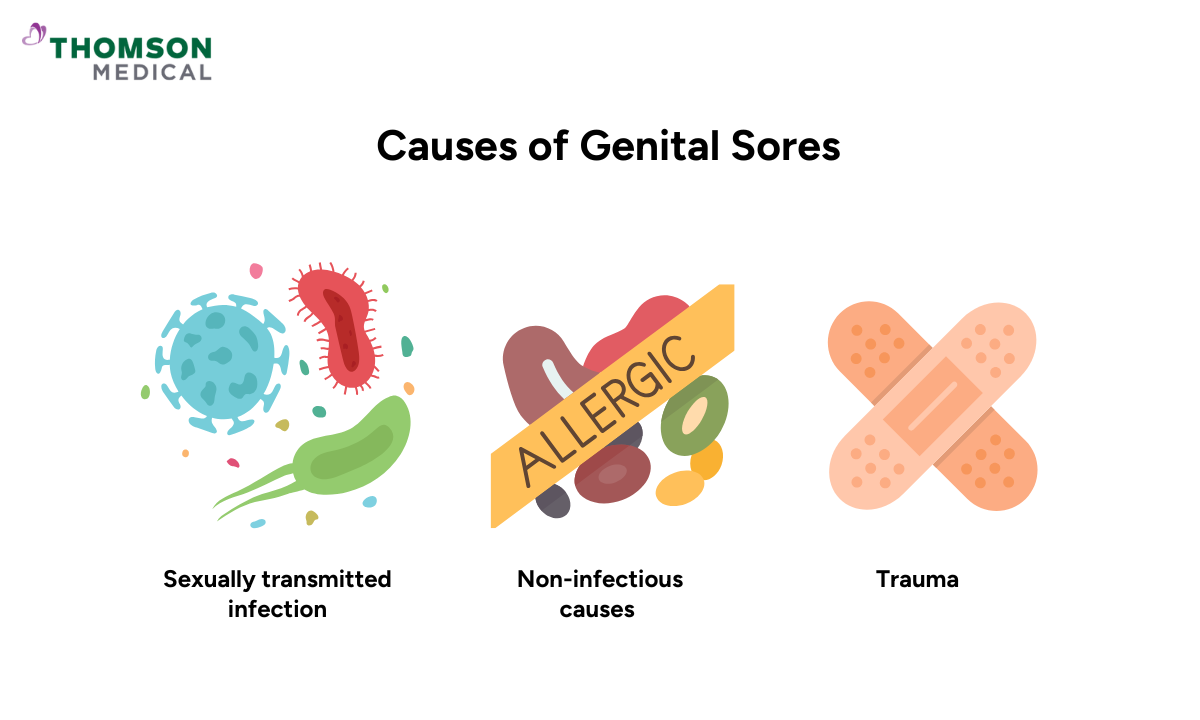Genital ulcers, also known as genital sores, are a common but often painful illness that can afflict both men and women. These ulcers can have a big effect on how comfortable you feel physically, sexually, and emotionally.
To manage them early and avoid consequences, it's important to know what causes them, how they develop, and what treatment options are available.
What is a genital ulcer?
A genital ulcer is an open sore that develops on or around the genital area. It represents a break in the skin or mucous membrane and may appear as a single lesion or multiple sores.
Genital ulcers can be painful or painless depending on their underlying cause. They may arise from infections, both sexually transmitted and non-sexually transmitted, or from trauma and inflammatory conditions.
Because ulcers disrupt the protective barrier of the skin, they are often accompanied by redness, swelling or discharge. They also increase the risk of secondary infections and, in some cases, HIV transmission.
How do ulcers form?

Ulcers form when the surface layer of the skin or mucosa is damaged and fails to heal properly, leaving an open wound. There are several common causes of genital ulcers, which include:
Sexually transmitted infections (STIs)
In the genital region, ulcers may be the result of sexually transmitted infections (STIs) such as herpes, syphilis or chancroid, where pathogens directly attack the tissue. According to new estimates released in 2024, around 846 million people aged 15–49 – over 1 in 5 globally – live with genital herpes.
Non-infectious causes
Non-infectious causes include inflammatory conditions, such as Behçet’s disease, autoimmune disorders or allergic reactions.
Once the outer layer is damaged, the body's immune system reacts by causing inflammation, which leads to redness, pain, or swelling. The ulcer may last until the main issue is addressed.
Trauma
Trauma is one of the major non-infectious causes of genital ulcers. It can be caused by incidents such as:
Repeated friction from tight clothing
Vigorous sexual activity
Cycling
Accidental injuries
Scratching due to itching
Irritation from hygiene products or harsh detergents
These traumatic ulcers are often painful and may improve once the source of irritation is removed, though medical care may still be required to promote healing and prevent complications.
Concerned about genital ulcers? Request an appointment with our specialists at Thomson Medical for a professional examination and personalised advice.
What do genital ulcers look and feel like
Genital ulcers vary in appearance depending on their cause:
Herpes ulcers:
Start as small blisters that burst into painful open sores
Syphilis ulcers:
A single, firm, painless ulcer called a chancre
Non-infectious ulcers:
Appear irregular, varying sizes and shapes
Ulcers can be painful, itchy, tender to the touch, or cause little to no discomfort
Additional signs:
Discharge
Swollen nearby lymph nodes
Symptoms of genital ulcers
Beyond the visible ulcers themselves, genital ulcers can present with a variety of symptoms, such as:
Pain, itching, tenderness
Burning sensation during urination if ulcers are near the urethra
Swollen groin lymph nodes, often with infections
Fever, malaise, or flu-like symptoms, especially with herpes
In women:
Abnormal vaginal discharge or bleeding with vulva/vaginal ulcers
In men:
Urethral discharge with penile or scrotal ulcers
The specific combination and severity of symptoms largely depend on the underlying cause of the genital ulcer.
If you notice any unusual symptoms in the genital region, Thomson Medical is ready to support you. Schedule an appointmentfor thorough testing, accurate diagnosis and compassionate care in a safe, judgement-free setting.
How do doctors diagnose genital ulcers?

Diagnosis begins with a thorough medical history and physical examination. Your doctor will often ask about recent sexual activity, past infections, travel history, and any systemic symptoms.
The appearance of the ulcer can provide clues, but laboratory testing is usually necessary for confirmation. You may need to undergo the following tests:
Swabs:
Test for herpes.
Bacterial cultures:
May be done for syphilis or chancroid.
Blood tests:
Identify systemic infections or autoimmune conditions.
Ulcer biopsy:
If cancer or other rare causes are suspected.
Our O&G specialists
Loading...
How are genital ulcers on or around the vulva and vagina treated?
Treatment varies according to the cause of the ulcer:
Infectious ulcers:
Genital herpes: antiviral medications can shorten outbreaks, relieve symptoms, and reduce the risk of transmission.
Syphilisand chancroid: respond well to antibiotic therapy, which eliminates the bacteria and prevents complications.
Non-infectious ulcers:
Treatment may involve corticosteroids, anti-inflammatory medications, or topical ointments to reduce discomfort and promote healing.
Pain relief, proper hygiene, and avoiding irritants are also important supportive measures.
Ulcers caused by trauma:
Remove the source of irritation.
Keep the area clean to allow natural healing.
Follow-up care is important to prevent recurrence and ensure that your genital ulcers can resolve fully.
FAQ
How to treat a ulcer in the vagina?
Treatment depends on the underlying cause. Infections like herpes may require antiviral medication, while bacterial infections such as syphilis or chancroid are treated with antibiotics. Non-infectious ulcers from trauma or inflammation can improve with topical creams, hygiene and supportive care. It is important to see a healthcare provider for proper diagnosis before starting treatment, since self-treating without knowing the cause can delay healing or even worsen your condition.
What STI causes genital ulcers?
Several sexually transmitted infections can cause genital ulcers. The most common are herpes and syphilis. Less common causes include Haemophilus ducreyi and chlamydia. Identifying the specific infection is important because treatment and long-term implications differ.
How long do genital ulcers last?
The duration of genital ulcers varies according to their cause and whether treatment is given. Herpes ulcers often last 1 to 3 weeks during an outbreak, while a syphilis chancre can last 3 to 6 weeks before healing, even without treatment. Traumatic ulcers, which are usually caused by irritation, may heal within days once the source of trauma is removed. However, ulcers from chronic conditions or autoimmune diseases may persist for much longer unless the underlying issue is managed.
Can you get genital ulcers without STDs?
Yes, not all genital ulcers are sexually transmitted. They may occur due to trauma, skin irritation, allergic reactions, or autoimmune conditions such as Behçet’s disease or Crohn’s disease. Viral infections unrelated to sexual activity, like Epstein-Barr virus or hand-foot-and-mouth disease in children, can also occasionally produce genital ulcers.
What can be mistaken for genital ulcers?
Many conditions can mimic genital ulcers, including:
Ingrown hairs, folliculitis, or small abscesses
Allergic reactions, yeast infections, or eczema
Lichen sclerosus or vulvar dermatitis in women
Vulvar or penile cancer may rarely start as a non-healing sore.
Because these conditions overlap in appearance, medical assessment is crucial to avoid misdiagnosis.
Can a UTI cause genital ulcers?
A urinary tract infection (UTI) itself does not cause ulcers, since it primarily affects the bladder and urinary system. However, the burning and frequent urination associated with UTIs can irritate the genital skin, sometimes leading to discomfort that might be mistaken for an ulcer. Also, STIs may cause ulcers, and you can have both a UTI and an STI.
Can stress cause genital ulcers?
Stress alone does not directly cause ulcers, but it can play an indirect role. Stress weakens the immune system, making it harder for the body to control viral infections such as herpes. Many people with genital herpes notice that outbreaks occur during periods of emotional or physical stress. Stress can also worsen inflammatory skin conditions, increasing irritation in the genital area.
The information provided is intended for general guidance only and should not be considered medical advice. For personalised recommendations and advice based on your unique situation, please consult a specialist at Thomson Medical. Request an appointment with Thomson Medical today.
For more information, contact us:
Thomson Specialists (Women's Health)
Thomson Women's Clinic (TWC)
- Novena:
6592 6686 (Call), 8611 8986 (WA) - Bukit Batok:
6569 0668 (Call), 8686 3525 (WA) - Choa Chu Kang:
6893 1227 (Call), 8282 1796 (WA) Jurong:
6262 8588 (Call), 6262 8588 (WA)- Katong (female doctor):
6970 2272 (Call), 8611 9020 (WA) - Punggol:
6243 6843 (Call), 8811 0328 (WA) - Sembawang: 6753 5228
- Sengkang: 6388 8125
- Serangoon (female doctor): 6382 3313
- Tampines: 6857 6266
- Tiong Bahru: 6276 1525
